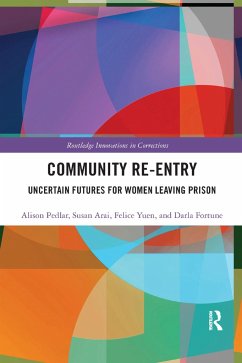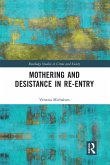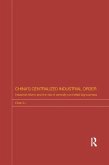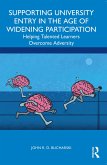- Broschiertes Buch
- Merkliste
- Auf die Merkliste
- Bewerten Bewerten
- Teilen
- Produkt teilen
- Produkterinnerung
- Produkterinnerung
Community Re-entry provides a rare opportunity to hear directly from women who have spent time in a Canadian federal penitentiary.
Andere Kunden interessierten sich auch für
![Gang Entry and Exit in Cape Town Gang Entry and Exit in Cape Town]() Dariusz Dziewanski (South University of Cape Town's Faculty of LawGang Entry and Exit in Cape Town57,99 €
Dariusz Dziewanski (South University of Cape Town's Faculty of LawGang Entry and Exit in Cape Town57,99 €![Case Studies in Infectious Disease Case Studies in Infectious Disease]() Peter Lydyard (Royal Free & UK Univ. College Medical School)Case Studies in Infectious Disease77,99 €
Peter Lydyard (Royal Free & UK Univ. College Medical School)Case Studies in Infectious Disease77,99 €![Mothering and Desistance in Re-Entry Mothering and Desistance in Re-Entry]() Venezia Michalsen (USA Montclair State University)Mothering and Desistance in Re-Entry63,99 €
Venezia Michalsen (USA Montclair State University)Mothering and Desistance in Re-Entry63,99 €![China's Centralized Industrial Order China's Centralized Industrial Order]() Chen Li (UK University of Cambridge)China's Centralized Industrial Order73,99 €
Chen Li (UK University of Cambridge)China's Centralized Industrial Order73,99 €![Supporting University Entry in the Age of Widening Participation Supporting University Entry in the Age of Widening Participation]() John R. D. BlicharskiSupporting University Entry in the Age of Widening Participation50,99 €
John R. D. BlicharskiSupporting University Entry in the Age of Widening Participation50,99 €![Planning Research in Hospitality and Tourism Planning Research in Hospitality and Tourism]() Levent Altinay (UK Oxford Brookes University)Planning Research in Hospitality and Tourism70,99 €
Levent Altinay (UK Oxford Brookes University)Planning Research in Hospitality and Tourism70,99 €![The Birth of Industrial Accounting in France and Britain The Birth of Industrial Accounting in France and Britain]() Trevor BoynsThe Birth of Industrial Accounting in France and Britain62,99 €
Trevor BoynsThe Birth of Industrial Accounting in France and Britain62,99 €-
-
-
Community Re-entry provides a rare opportunity to hear directly from women who have spent time in a Canadian federal penitentiary.
Hinweis: Dieser Artikel kann nur an eine deutsche Lieferadresse ausgeliefert werden.
Hinweis: Dieser Artikel kann nur an eine deutsche Lieferadresse ausgeliefert werden.
Produktdetails
- Produktdetails
- Innovations in Corrections
- Verlag: Taylor & Francis Ltd
- Seitenzahl: 198
- Erscheinungstermin: 11. September 2019
- Englisch
- Abmessung: 229mm x 152mm x 11mm
- Gewicht: 294g
- ISBN-13: 9780367367664
- ISBN-10: 0367367661
- Artikelnr.: 57782050
- Herstellerkennzeichnung
- Libri GmbH
- Europaallee 1
- 36244 Bad Hersfeld
- gpsr@libri.de
- Innovations in Corrections
- Verlag: Taylor & Francis Ltd
- Seitenzahl: 198
- Erscheinungstermin: 11. September 2019
- Englisch
- Abmessung: 229mm x 152mm x 11mm
- Gewicht: 294g
- ISBN-13: 9780367367664
- ISBN-10: 0367367661
- Artikelnr.: 57782050
- Herstellerkennzeichnung
- Libri GmbH
- Europaallee 1
- 36244 Bad Hersfeld
- gpsr@libri.de
Alison Pedlar is a Distinguished Professor Emerita, University of Waterloo, Ontario. Alison has broad applied research and practical experience in issues related to disability, aging, and leisure services in Canada. Her teaching and research activity focused on social policy, planning, and development of human services. Much of her work was conducted within a participatory and collaborative research framework, and included community development work with older adults, individuals with disabilities, criminalized women, and other marginalized populations. Her primary research program was concerned with community, citizenship, social justice, and rights. Susan Arai is a registered psychotherapist and Adjunct Professor in Recreation and Leisure Studies at the University of Waterloo, Ontario. During Sue's 20-year career in the departments of Community Health Sciences (Brock University) and Leisure Studies (University of Waterloo) her writing and practice focused on mindfulness, healing and transformation in the aftermath of trauma, navigations of oppression and marginalization within social systems and institutions, community inclusion, critical pedagogy, and reflective practice. Sue has worked and conducted research in health and human services with hospitals, municipal and regional governments, federal corrections, community health centers, healthy-communities initiatives, social-planning councils, and disability organizations. She is currently in private practice and a clinical member of the Ontario Society of Psychotherapists. She has received training in relational psychotherapy, Psych-K®, mindfulness-based stress reduction®, mindfulness-based cognitive therapy, and sensorimotor psychotherapy. Darla Fortune is an Assistant Professor at Concordia University in Montreal, Quebec. Her research is embedded in a concern for social justice and aims to create positive change in the lives of people most at risk of experiencing exclusion from community. In past research, Darla engaged with women who entered community after a period of incarceration to critically examine the notion of inclusion for individuals who often experience chronic marginalization. Themes of inclusion and social justice have been carried into Darla's research within the contexts of dementia and long-term care. In this realm, Darla strives to counter dehumanizing care practices dominated by medical and institutional models of care by emphasizing the need for a cultural shift that embraces relational approaches. A belief in the capacity of individuals who are marginalized to create positive social change drives Darla's research program. Felice Yuen is an Associate Professor at Concordia University in Montreal, Quebec, in the Department of Applied Human Sciences. Broadly, her research encompasses healing, social justice, and community development. She often employs arts-based approaches in her research. Her work with the Native Sisterhood, an Indigenous women's group in a federal prison, and with Journey Women, a group of women dedicated to exploring and advocating for Indigenous women's healing, has led to publications in Critical Criminology , Arts in Psychotherapy, Leisure Sciences, and the Journal of Leisure Research.
1. Incarceration and Community Re
Entry for Women. 2. Studying Community Re
Entry for Federally Sentenced Women. 3. Defining Aspects of Everyday Life: Poverty, Trauma, and Substance
Dependence. 4. The Downward Spiral of Prison Life. 5. Finding Identity. 6. Getting Out and Staying Out.
Entry for Women. 2. Studying Community Re
Entry for Federally Sentenced Women. 3. Defining Aspects of Everyday Life: Poverty, Trauma, and Substance
Dependence. 4. The Downward Spiral of Prison Life. 5. Finding Identity. 6. Getting Out and Staying Out.
1. Incarceration and Community Re
Entry for Women. 2. Studying Community Re
Entry for Federally Sentenced Women. 3. Defining Aspects of Everyday Life: Poverty, Trauma, and Substance
Dependence. 4. The Downward Spiral of Prison Life. 5. Finding Identity. 6. Getting Out and Staying Out.
Entry for Women. 2. Studying Community Re
Entry for Federally Sentenced Women. 3. Defining Aspects of Everyday Life: Poverty, Trauma, and Substance
Dependence. 4. The Downward Spiral of Prison Life. 5. Finding Identity. 6. Getting Out and Staying Out.








